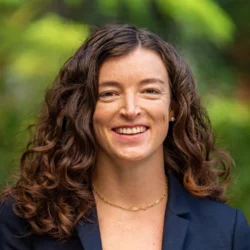
About
Research Interests: Cellular stress responses are ancient, highly conserved programs that enable cellular survival in harsh conditions. These powerful responses fundamentally rewire the cell’s expression of the central dogma--broadly altering translational, transcriptional, and metabolic activity--and are highly adaptive when mobilized at the right time and the right place. However maladaptive activation of stress response, for example when a response becomes chronically activated even after an initial stress signal is no longer present, is a hallmark of age-related and neurodegenerative diseases.
The decision to activate a stress response is coordinated by dynamic protein machines that instigate the many diverse outcomes of stress response. The Lawrence lab will build on key breakthroughs enabled by recent advances in structural biology: the demonstration that conformation of stress response machines encodes stress response outcomes. Our previous work has combined integrated structural approaches with genome editing and cell biological signaling experiments to map the dynamic behavior of active and inactive stress response sensors. In the Lawrence lab, we will build on these discoveries with a particular interest in how cellular metabolic state is parsed by the stress response machinery, and how in turn stress responses remodel metabolism. We are also motivated to define cellular and metabolic mechanisms of stress-linked neurodegenerative disease. To this end, we have engineered disease-linked chronic stress signaling states into glial cells using structure-guided design, and are using these systems as platforms to define specific molecular mechanisms underlying failed intercellular communication in stress-linked neurodegenerative disease.
Biography: Rosalie Lawrence completed a BA with High Honors at Swarthmore College, majoring in Biology and minoring in Biochemistry, where she studied heat shock responses in Arabidopsis thaliana. She then completed a Fulbright Research Fellowship at the University of Botswana developing plant-based vaccines. As a NSF GRFP graduate student in the Roberto Zoncu lab at UC Berkeley, she identified mechanisms of nutrient sensing at the lysosome by the mTORC1 complex, discovering the Lysosomal Folliculin Complex. As a Jane Coffin Childs Postdoctoral fellow in the Peter Walter lab at UCSF, she discovered the allosteric mechanism that activates the Integrated Stress Response (ISR). The Lawrence Lab opens in January 2025, combining biochemical, cell biological, and physiological approaches to define metabolic mechanisms of cellular stress response in health and disease.